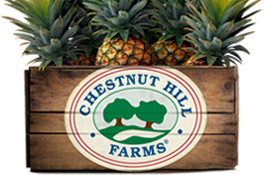How Sustainable Farming Practices Make Our Pineapples Perfect
Part of what makes our pineapples perfect is our dedication to implementing our sustainable farming practices. Being one of the top three pineapple importer to North America, we understand that it is our responsibility to implement these practices to better benefit the environment and our workers.
It All Starts With the Soil
One way in which we maintain sustainable practices on our farms, is by incorporating organic material into the soil on our farms. After harvest, pineapple plants leave an estimated 300 tons of pineapple per hectare. We re-incorporate this material to maintain good soil structure and nutrient levels, as well as to improve Cation exchange capacity of the soil. Secondarily, we incorporate beneficial bacteria and fungi into the soil to aid in the reduction of our use of chemical pesticides.
Maintenance of the Natural Forest
Here at Chestnut Hill Farms, we maintain over 275 hectares of forest reserve that acts as a barrier between pineapple plantings and major water sources, in order to reduce our carbon footprint while also providing habitats for local wildlife. In addition to this protected area, 40 hectares of native fruit trees have been plated to provide food supplies for these creatures.
Reduction of Use of Herbicides and Pesticides
To reduce the use of pesticides and herbicides on our perfect pineapples, herbicide application after planting is done only on an as-needed basis. We use a spot treatment to treat only affected areas so the use of herbicides is greatly reduced. The same is done with the use of pesticides.
Did You Know?
Although we take pride in our sustainable farming practices on our farms as a whole, the end goal this work and dedication is to produce the perfect pineapple for you to eat! Here are a few facts about our fresh, sweet pineapples:
- Our pineapples are MD2 pineapples. The MD2 hybrid pineapple was developed prior to the mid 1990’s to satisfy an increase in demand for pineapple consumption and exceptional sweetness. Our MD2 pineapples also have the benefit of increased uniformity and consistency in size and ripeness.
- A green pineapple does not mean that it isn’t ripe! The color of a pineapple’s skin varies from summer to winter, so yellow or green, they’re all delicious! Any pineapple available to you in the supermarket is ripe and ready to enjoy.
- Not only are pineapples delicious, they are great for your health! Pineapples have been found to improve immunity, improve eye health, lower cancer risk, help minimize calorie consumption and work as an anti-inflammatory.
- Pineapples are actually a berry! According to Union County College, the pineapple belongs to the bromeliad family and is one of the few to produce an edible fruit. So truly, a pineapple is made up of several berries that fuse together around a central core. Those “scales” that you see on a fresh pineapple’s skin? Well, those are all actually separate berries!


